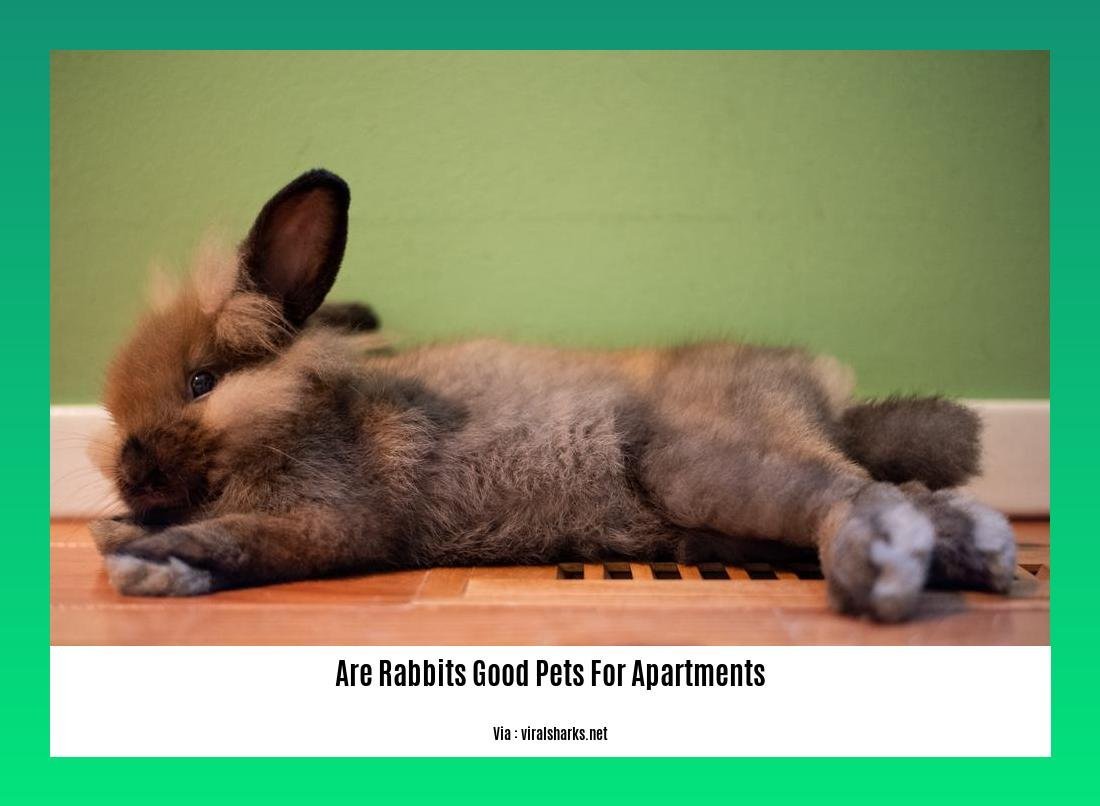Are Rabbits Good Pets for Apartments? A Comprehensive Guide to Responsible Rabbit Ownership
Rabbits have long captured the hearts of animal lovers with their adorable floppy ears and playful personalities. But when it comes to apartment living, many potential pet owners wonder if these furry creatures are a suitable choice. In this comprehensive guide, we will explore the question of whether rabbits make good pets for apartments. We will delve into their unique needs, behavior, and the essential factors to consider before bringing a rabbit into your apartment. By the end of this article, you will be equipped with the knowledge to make an informed decision and provide a loving and secure environment for your apartment-dwelling rabbit.
Key Takeaways:
- Rabbits are suitable pets for apartment living as they are small, quiet, and can be litter-box trained.
- It is important to provide rabbits with space in the apartment for their cage and a larger play area.
- There are nearly 50 breeds of rabbits that make popular pets.
- Most rabbits are social animals and enjoy human companionship.
- Realistic expectations regarding the time and energy required for caring for a pet rabbit are crucial.
- Sources:
- “Are Rabbits Good Apartment Pets?” by Rabbit Pros (
- “12 Best Exotic Pets for Apartment Living” by The Spruce Pets (
Are Rabbits Good Pets for Apartments?

Rabbits can make wonderful and rewarding pets for apartment living. With their small size, quiet demeanor, and ability to be litter-box trained, they are well-suited to apartment life. However, it’s important to understand the specific needs and requirements of rabbits before bringing one into your apartment. In this comprehensive guide, we will explore the characteristics of rabbits, their living requirements, exercise needs, potential challenges, and tips for responsible rabbit ownership in an apartment setting.
Characteristics of Rabbits
Rabbits come in nearly 50 different breeds, each with its own distinct characteristics and appearance. From the long-eared and floppy-furred floppy-eared lops to the energetic and playful Dutch rabbits, there is a breed to suit every owner’s preference. Most rabbits are social animals that enjoy human interaction and can form strong bonds with their owners, making them excellent companions for apartment dwellers seeking some furry companionship.
Living Requirements for Rabbits in Apartments
While rabbits are small, they still require some space in an apartment to thrive. It’s essential to provide them with a suitable cage that is spacious enough for them to stretch out and move around comfortably. Additionally, rabbits will benefit from having a designated play area where they can exercise and explore their surroundings. This can be as simple as a designated corner with some toys and tunnels to keep them entertained and stimulated. By meeting their living requirements, you can ensure that your rabbit feels happy and content in your apartment.
Exercise Needs of Rabbits
Regular exercise is crucial for the well-being of rabbits, even in an apartment setting. They need opportunities to hop, run, and play to maintain their physical health and mental stimulation. Allocating time each day for supervised exercise outside of their cage will help keep them happy and prevent boredom. You can create a safe and supervised space for your rabbit to explore and play by rabbit-proofing a designated area in your apartment. Removing any potential hazards and providing toys or puzzles for them to interact with can make exercise time even more enjoyable for your furry friend.
Potential Challenges of Owning a Rabbit in an Apartment
While rabbits are generally suitable for apartment living, it’s important to be aware of potential challenges that may arise. Rabbits can be prone to chewing on furniture and electrical cords, so it’s important to provide them with appropriate chew toys and ensure your apartment is rabbit-proofed. Additionally, rabbits have specific dietary needs and require a balanced diet that includes hay, fresh vegetables, and a limited amount of pellets. Regular veterinary care and potential health issues should also be taken into consideration when deciding to bring a rabbit into your apartment.
Tips for Responsible Rabbit Ownership in Apartments
Here are some key tips to ensure responsible rabbit ownership in an apartment:
- Research: Educate yourself about the specific needs of rabbits and their suitability for apartment living.
- Prepare the Living Space: Set up a comfortable and stimulating living area for your rabbit, including a suitable cage and a designated play area.
- Provide Adequate Exercise: Schedule regular exercise time outside of the cage to keep your rabbit physically and mentally stimulated.
- Rabbit-Proof Your Apartment: Remove any potential hazards and provide appropriate chew toys to prevent destructive behaviors.
- Adopt or Rescue: Consider adopting a rabbit from a shelter or rescue organization instead of purchasing one from a pet store.
- Establish a Relationship with a Rabbit-Savvy Veterinarian: Find a veterinarian who has experience and knowledge in rabbit care to ensure your pet’s well-being.
- Regular Veterinary Care: Schedule routine check-ups and vaccinations for your rabbit to keep them healthy.
- Enjoy the Companionship: Interact with your rabbit daily, provide them with love and attention, and enjoy the unique bond that can develop.
By following these tips, you can create a harmonious and fulfilling living environment for your rabbit in your apartment.
Table: Potential Pros and Cons of Owning a Rabbit in an Apartment
| Pros | Cons |
|---|---|
| Small and quiet pets | Potential chewing and destructive behavior |
| Can be litter-box trained | Specific dietary needs and potential health concerns |
| Social animals that enjoy human interaction | Space requirements for cage and exercise area |
| Form strong bonds with their owners | Regular veterinary care and potential health issues |
| Provide companionship for apartment dwellers | Responsibility of providing a stimulating environment |
In conclusion, rabbits can indeed make excellent pets for apartment living. Their small size, quiet nature, and potential for litter-box training make them well-suited for apartment life. By understanding their needs, providing appropriate living space, and meeting their exercise requirements, you can create a fulfilling and rewarding experience for both you and your rabbit. Remember to always approach rabbit ownership with responsibility and educate yourself about their specific care requirements. With proper care and attention, rabbits can thrive and bring joy and companionship to your apartment lifestyle.
Are pets good for autism? Find out more about their benefits by clicking here.
Are rabbits good pets for seniors? Discover the perfect companionship by clicking here.
Curious about sausage dogs? Learn whether they are dangerous or not by clicking here.
Concerned about the toxicity of string of turtles to dogs? Click here to find out more.
Exercise Needs and Challenges for Apartment Rabbits

Rabbits can make wonderful apartment pets, but it’s important to understand their exercise needs and the challenges that may arise in a confined living environment. In this article, we will explore the specific requirements and potential difficulties of providing exercise for rabbits in an apartment setting.
Understanding Rabbit Exercise Needs
Rabbits are active animals that require regular exercise to maintain their physical and mental well-being. Daily exercise helps prevent obesity, promotes cardiovascular health, and prevents boredom and destructive behaviors. [Exercise needs and challenges for apartment rabbits] are crucial aspects to consider when deciding to bring a rabbit into your apartment.
Rabbits have a natural instinct to explore and hop around, so it’s important to provide them with enough space to do so. Ideally, an apartment rabbit should have access to a designated play area outside of their cage. This area should be safe, enclosed, and free from potential hazards. A secure exercise pen or a rabbit-proofed room can serve as a suitable play space for your bunny.
Challenging Exercise Needs in Apartments
While rabbits can thrive in apartments, there are some challenges to consider when it comes to meeting their exercise needs. Limited space may be one of the main obstacles, especially if you live in a small apartment. Providing enough room for your rabbit to hop, run, and engage in natural behaviors can be a challenge in a confined setting.
Another challenge may arise if you have multiple pets or limited time to supervise your rabbit’s exercise. It’s important to ensure that your rabbit can exercise safely without the risk of confrontation with other animals. Additionally, if your work schedule or other commitments hinder your ability to provide supervised exercise sessions, you may need to find alternative ways to meet your rabbit’s exercise requirements.
Overcoming Exercise Challenges
Despite the challenges, there are several strategies that can help you provide adequate exercise for your apartment rabbit. Here are some tips to overcome the exercise challenges and ensure your furry friend stays happy and healthy:
-
Create a designated exercise area: Set up a safe and enclosed space where your rabbit can freely move and explore. This area should be away from potential hazards like cords, toxic plants, or fragile objects.
-
Utilize vertical space: Make use of vertical space by setting up ramps, shelves, or tunnels for your rabbit to climb, hop on, and explore. This can help compensate for limited floor space in your apartment.
-
Interactive toys and mental stimulation: Provide your rabbit with toys, puzzles, and treat-dispensing toys that promote mental stimulation. These can keep your rabbit engaged and entertained, even in a confined space.
-
Ongoing enrichment: Regularly introduce new toys, tunnels, or cardboard boxes for your rabbit to explore and interact with. This adds variety to their environment and keeps them mentally stimulated.
-
Supervised out-of-cage time: Set aside dedicated time each day to allow your rabbit to roam and exercise outside of their cage. Ensure the area is secure and free from potential dangers.
-
Treat-based exercise: Use treats strategically to encourage your rabbit to hop, jump, and move around. You can hide treats in different areas of their play space to encourage exploration and exercise.
-
Consider a playmate: If feasible, consider adopting another rabbit as a playmate for your apartment rabbit. Having a bunny companion can provide additional exercise opportunities and alleviate any potential loneliness.
Remember, the key to meeting your rabbit’s exercise needs in an apartment setting is to be creative, resourceful, and committed to providing regular opportunities for physical activity and mental stimulation.
Key Takeaways:
- Rabbits require daily exercise to stay healthy and happy.
- Providing an enclosed play area outside of their cage is essential for apartment rabbits.
- Limited space and potential conflicts with other pets may pose challenges for meeting exercise needs.
- Overcoming challenges involves creating a safe exercise area, utilizing vertical space, providing interactive toys, ensuring ongoing enrichment, scheduling supervised out-of-cage time, using treat-based exercise, and considering a playmate.
- Being resourceful and committed to meeting your rabbit’s exercise needs will help them thrive in an apartment setting.
Sources:
– Rabbit Pros. “Are Rabbits Good Apartment Pets? 10 Things To Know.”
– PetWah. “Rabbit Exercise 101: The Ultimate Guide To Meeting Your Pet.”
Tips for caring for a rabbit in an apartment setting
Living in an apartment doesn’t mean you can’t enjoy the joys of pet ownership, and rabbits can be wonderful companions for apartment dwellers. However, there are some important considerations to keep in mind to ensure that your rabbit is happy and healthy in their apartment home. Here are some tips for caring for a rabbit in an apartment setting:
1. Create a safe and comfortable living space:
– Make sure you’re allowed pets in your apartment, and consider spaying or neutering your rabbit.
– Provide a home base for your rabbit, such as a cage or hutch, where they can retreat and feel secure.
– Opt for an enclosure that’s easy to clean, as rabbits can be messy.
2. Be mindful of space limitations:
– Use space-saving furniture to maximize the available room in your apartment for your rabbit’s living area.
– Cover carpets with protective coverings to prevent stains or damage from rabbit droppings.
– Block baseboards and other areas that rabbits may chew on, as this is a common behavior.
3. Prioritize exercise and mental stimulation:
– Regular exercise is crucial for a rabbit’s physical health and mental well-being.
– Set up a designated play area in your apartment where your rabbit can safely explore and stretch their legs.
– Supervised exercise outside of the cage, such as allowing them to roam in a rabbit-proofed room, is highly recommended.
4. Rabbit-proof your apartment:
– Take steps to bunny-proof your apartment by securing wires, cords, and other potential hazards that rabbits may chew on.
– Keep a safe and quiet environment for your rabbit, away from loud noises or stressful activities.
5. Budget for rabbit enrichment:
– Remember to allocate a budget specifically for rabbit enrichment, such as toys, tunnels, and interactive feeders to keep your pet stimulated and entertained.
6. Litter-box train your rabbit:
– Rabbits can be litter-box trained, making apartment living much more convenient.
– Provide a litter box with rabbit-safe bedding and encourage your rabbit to use it consistently.
By following these tips and being mindful of your rabbit’s needs, you can create a safe and happy environment for your furry friend in your apartment. Remember to do your research, prepare your living space, and provide adequate exercise and enrichment. With the right care, having a rabbit as a pet in an apartment can be a rewarding and joyful experience.
Key Takeaways:
- Ensure you are allowed pets in your apartment and consider spaying or neutering your rabbit.
- Provide a safe and comfortable living space, such as a cage or hutch, that’s easy to clean.
- Utilize space-saving furniture and cover carpets to protect against damage.
- Prioritize regular exercise and mental stimulation, setting up a designated play area in your apartment.
- Rabbit-proof your living space by securing wires and blocking access to potential hazards.
- Allocate a budget for rabbit enrichment, such as toys and interactive feeders.
- Litter-box train your rabbit for convenient apartment living.
Sources:
– Cottontail Club. How to Keep a Rabbit in an Apartment.
– Bunny Lady. Rabbits in Apartments.
Considerations for Apartment Dwellers Before Getting a Rabbit
Rabbits can make wonderful pets for apartment dwellers, but it’s essential to consider a few important factors before bringing one into your living space. By taking the following considerations into account, you can ensure a happy and healthy environment for both you and your furry friend.
1. Get Permission from Your Landlord
Before adding a rabbit to your apartment, check your lease agreement to see if there are any restrictions on the types of pets allowed. While cats and dogs are commonly mentioned, rabbits may not be explicitly mentioned. It’s crucial to clarify with your landlord to ensure that keeping a rabbit is allowed before bringing one home. [Considerations for apartment dwellers before getting a rabbit]
2. Understand the Needs of a Rabbit
Rabbits have specific requirements that need to be met for their well-being. They need a suitable living space, a balanced diet, regular exercise, and social interaction. Research and understand these needs to ensure that you can provide the necessary care and attention for your rabbit.
3. Create a Suitable Living Space
In an apartment, it’s important to consider the size of your rabbit’s living space. Dedicate a specific area where your rabbit can retreat, rest, and play. This can be a rabbit hutch, a large playpen, or even a room specifically for your rabbit. A suitable enclosure should be easy to clean and provide enough room for your rabbit to move around comfortably.
4. Accommodate for Exercise Needs
While living in an apartment might limit your rabbit’s ability to roam freely, it’s crucial to provide plenty of exercise opportunities. Set up a bunny-proofed play area where your rabbit can stretch their legs and engage in natural behaviors. Regular exercise is necessary for their physical health and mental stimulation.
5. Consider Behavioral Challenges
Rabbits have a natural instinct to chew and dig, which may pose challenges in an apartment setting. Protect your furniture, carpets, and baseboards by using appropriate coverings or designated chew toys. Regularly clip your rabbit’s nails to prevent scratching and potential injuries.
6. Research Dietary Requirements
A well-balanced diet is vital for your rabbit’s health. It should include a variety of fresh vegetables, high-quality hay, and a limited amount of pellets. Ensure that you have access to the necessary fresh produce and can commit to providing the appropriate diet for your rabbit.
7. Seek Companionship for Your Rabbit
Rabbits are social animals and require daily interaction and companionship. Spend quality time with your rabbit, engage in play, and provide mental stimulation through toys and games. If appropriate, consider getting a companion rabbit to keep your furry friend company.
8. Be Prepared for Vet Care
Rabbits require regular veterinary care to ensure their well-being. Find a veterinarian who is knowledgeable about rabbits and can provide routine check-ups and any necessary medical treatments. Budget for medical expenses and be prepared to schedule regular visits to keep your rabbit in good health.
Key Takeaways:
- Check if your apartment allows rabbits before bringing one home.
- Understand the specific needs and requirements of rabbits as pets.
- Create a suitable living space with a designated area for your rabbit.
- Accommodate for exercise needs by setting up a bunny-proofed play area.
- Be prepared for potential behavioral challenges, such as chewing and digging.
- Research and provide a well-balanced diet for your rabbit.
- Seek companionship for your rabbit through daily interaction and potential rabbit companions.
- Find a veterinarian knowledgeable about rabbits for regular check-ups and medical care.
Sources:
FAQ
Q1: Are rabbits suitable pets for apartment living?
A1: Yes, rabbits can make good pets for apartment living. They are small, quiet, and can be litter-box trained, making them suitable for indoor environments. However, there are certain considerations and preparations that need to be made to ensure a happy and healthy living environment for rabbits in apartments.
Q2: Can rabbits live with other pets in an apartment?
A2: Rabbits can live harmoniously with other pets such as cats and dogs in an apartment. However, it is important to consider the temperament and behavior of the existing pets. Some cats and dogs may have a strong prey drive, which can pose a risk to the safety of the rabbit. Introducing them slowly and under supervised circumstances is recommended to ensure compatibility.
Q3: How much space do rabbits need in an apartment?
A3: While rabbits are small pets, they still require some space in the apartment. They will need a cage or hutch for their living space, as well as a larger play area where they can exercise and explore. The size of the living area should be based on the specific needs of the rabbit and the available space in the apartment.
Q4: How can I provide mental stimulation for my rabbit in an apartment?
A4: It is important to provide mental stimulation for rabbits in an apartment setting to prevent boredom and promote their overall well-being. This can be done through interactive toys, puzzles, and games that encourage their natural behaviors, such as foraging and chewing. Spending quality time with your rabbit and providing social interaction is also crucial for their mental stimulation.
Q5: What should I consider before getting a rabbit as a pet in an apartment?
A5: Before getting a rabbit as a pet in an apartment, there are several important considerations to keep in mind. These include checking if your apartment allows pets, spaying or neutering your rabbit, providing a suitable housing option, ensuring a proper diet and nutrition, finding a reliable rabbit sitter for when you are away, and budgeting for rabbit enrichment. It is important to have a clear understanding of the responsibilities and commitments involved in responsible rabbit ownership before bringing one into your apartment.
- Unveiling the Enigma: Mansoureh Khojasteh Bagherzadeh’s Public Appearances & Private Life in Iran - July 18, 2025
- Unveiling the Mystery: Mansoureh Khojasteh Bagherzadeh’s Husband: A Rare Glimpse into a Private Life - July 18, 2025
- Unveiling Masoud Khamenei’s Mother: Power, Influence, and Iran’s Future - July 18, 2025
















